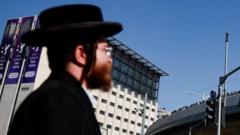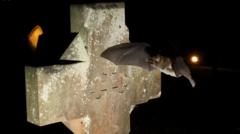Why Are Hundreds of Thousands of Ultra-Orthodox Israelis Protesting Conscription?

Published: 2025-10-30 23:00:18 | Category: world
Hundreds of thousands of ultra-Orthodox Jewish Israelis are participating in a significant protest in Jerusalem against proposed changes to legal exemptions that allow religious students to avoid military conscription. This event, referred to as the "march of the million," unites various factions of the ultra-Orthodox or Haredi community, which constitutes approximately 14% of Israel's population. The protests have been driven by demands for a more equitable sharing of military responsibilities and an increasing frustration over the arrest of ultra-Orthodox men evading the draft. The implications of these protests are profound, impacting both military recruitment and the cultural landscape of Israeli society.
Last updated: 17 October 2023 (BST)
What’s happening now
The ongoing protests in Jerusalem reflect a growing tension between the ultra-Orthodox community and the state of Israel regarding military conscription. The proposed changes to the exemption policy for students of yeshivas (religious schools) have sparked widespread outrage. As the Israeli government seeks to address manpower shortages exacerbated by conflicts, particularly the recent war in Gaza, the ultra-Orthodox community is rallying to defend their traditional way of life and their religious exemptions. Roads across Jerusalem have been closed to accommodate the protesters, indicating the scale and significance of the event.
Key takeaways
- Hundreds of thousands of ultra-Orthodox Jews are protesting military conscription exemptions.
- The protests are a united front from various Haredi factions, highlighting community solidarity.
- Concerns include the potential threat to traditional lifestyles and the impact of conscription on military integration.
Timeline: how we got here
The debate over military conscription for ultra-Orthodox Jews has a long history, with significant milestones including:
- 1948: Israel's founding, with initial military exemption policies for yeshiva students established.
- 1990s: Legal rulings and political agreements begin shaping the current exemption framework.
- October 2023: Massive protests erupt in response to proposed changes to the conscription exemption laws amid the ongoing conflict in Gaza.
What’s new vs what’s known
New today/this week
The protests in Jerusalem have escalated, drawing in various factions of the Haredi community who have historically been divided on issues of military service. The government's push for increased conscription is viewed as a direct threat to their way of life, prompting this unprecedented unity.
What was already established
It has long been established that students in yeshivas are exempt from military service, which has been a contentious issue in Israeli society. Previous debates have focused on the fairness of this exemption, especially during times of national conflict, where calls for equal service have intensified.
Impact for the UK
Consumers and households
For UK residents, the events in Israel highlight the complexities of balancing religious freedoms with national service obligations. The protests could influence public opinion regarding military service and the treatment of religious minorities within the UK context, particularly in discussions about integration and societal responsibilities.
Businesses and jobs
In Israel, the protests may impact businesses, particularly those that serve the ultra-Orthodox community, as tensions could lead to disruptions. For UK businesses observing these developments, understanding community dynamics could be crucial for navigating similar societal issues.
Policy and regulation
The situation could prompt discussions in the UK regarding military service policies, especially in relation to minority communities and their obligations. Observing how Israel handles these tensions may provide insights into managing similar situations in the UK.
Numbers that matter
- Approximately 14% of Israel's population identifies as ultra-Orthodox.
- Hundreds of thousands are estimated to be participating in the protests.
- There have been hundreds of arrests of ultra-Orthodox men avoiding the draft in recent months.
Definitions and jargon buster
- Haredi: A term used to describe the ultra-Orthodox Jewish community in Israel.
- Yeshiva: A traditional Jewish school for the study of religious texts.
- Conscription: Mandatory enlistment for military service.
How to think about the next steps
Near term (0–4 weeks)
In the immediate future, observers should watch for the government's response to the protests and any legal changes regarding military conscription policies. Increased tensions could lead to further demonstrations or government crackdowns.
Medium term (1–6 months)
In the coming months, the impact of these protests may influence the political landscape in Israel, particularly in upcoming elections. The responses from both the ultra-Orthodox community and the government could shape future policies and community relations.
Signals to watch
- Changes in military conscription laws or exemptions.
- Responses from community leaders within the Haredi public.
- Public opinion shifts within Israeli society regarding military service.
Practical guidance
Do
- Stay informed on developments regarding military policy changes in Israel.
- Consider the implications of these protests on minority rights and national obligations.
- Engage in discussions about how such issues relate to societal values in the UK.
Don’t
- Assume uniformity within the ultra-Orthodox community; there are diverse opinions.
- Overlook the historical context of military exemptions and religious freedoms.
- Neglect the potential for similar issues arising in the UK context.
Checklist
- Monitor news sources for updates on the protests and government responses.
- Engage with community discussions about military service and minority rights.
- Educate yourself on the cultural dynamics of the ultra-Orthodox community.
Risks, caveats, and uncertainties
As the situation evolves, it is crucial to remain cautious in interpreting developments. The scale of the protests and the potential for government backlash may lead to unpredictable outcomes. Additionally, the complexity of integrating ultra-Orthodox individuals into military service poses significant challenges that may not be easily resolved. These uncertainties underscore the need for careful observation and consideration of multiple perspectives.
Bottom line
The protests in Jerusalem represent a pivotal moment for the ultra-Orthodox community in Israel, highlighting deep-seated tensions over military service and religious freedoms. The outcome of these demonstrations may not only affect Israeli society but could also resonate with discussions about minority rights and responsibilities in the UK. As this situation unfolds, it is essential to consider the broader implications for community relations and societal obligations.
FAQs
What is the "march of the million"?
The "march of the million" refers to the large-scale protests by the ultra-Orthodox community in Jerusalem against proposed changes to military conscription exemptions for religious students.
Why are ultra-Orthodox Jews protesting?
They are protesting against potential enforcement of military conscription, which they believe threatens their traditional way of life and religious practices.
What impact could these protests have on Israeli society?
The protests may influence public opinion on military service, potentially leading to changes in policies regarding conscription and community integration.



